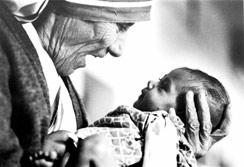| 
ABOVE: Mother Teresa 1979 Nobel Peace Prize Laureate, leader of the Order of the Missionaries of Charity.
“If unselfish love does not extend over the whole of mankind, if it is confined within one group—a given family, tribe, nation, race, religious denomination, political party, trade nation, caste, social class or any part of humanity— such an in-group altruism tends to generate an out-group antagonism.”
— Pitirim Sorokin
| | |  | The Institute for Research on Unlimited Love is a nonprofit organization funded by the Foundation and located at the School of Medicine at Case Western Reserve University. The Institute seeks to improve understanding of the human capacities for participation in unlimited love through high-level scientific research, conferences, seminars and publications. It awards grants to projects in a variety of academic fields and seriously engages the intersection of science and spirituality. Today, institute-funded researchers at more than 30 leading universities are publishing in journals, presenting at professional meetings and teaching new courses.
Folks will say that if you scratch an altruist, you’ll watch an egoist bleed, but my hypothesis is that if you scratch an egoist, you’ll watch an altruist bleed,” says Stephen G. Post, a professor at the Center for Biomedical Ethics at Case Western Reserve University and president of the Cleveland-based Institute for Research on Unlimited Love.
Post’s hypothesis is but one of many being explored by the Institute that he leads, as researchers are identifying key questions about love and then looking for ways to answer them. Just a few decades ago, however, love was a topic completely outside science. Today, research in this area requires breaking new ground. Scientists must address such basic questions as: How do you even approach the study of love? Can love be learned? Can we learn to love our neighbor, even when this neighbor can offer back nothing in return? What if that “neighbor” is a historic enemy? Can centuries-old hatreds be healed by love? What can we learn from the lives of truly generous individuals? Can we learn how to work together in our growing struggle against violence and assaults against human well-being? In the end, is it really better to give than to receive?
With scientific answers to these and similar questions, The Institute for Research on Unlimited Love believes we can make a better future. Stephanie Brown, a psychologist from the University of Michigan’s Institute for Social Research has found an association between giving help and longevity. Robert Emmons, a psychology professor at the University of California, Davis, has found that when people are grateful, they are more likely to be altruistic. Julie Juola Exline, an assistant professor of psychology at Case Western Reserve University, is working on a “conduit model of love” that might be able to help us act kindly to strangers and enemies. This year, for the first time, the General Social Survey, funded by the National Science Foundation and conducted by the National Opinion Research Center at the University of Chicago, will gather nationally representative data on altruism and unlimited love.
Since 2001, the Institute for Research on Unlimited Love has funded high-quality scientific research projects that advance our understanding of altruism and disseminated true stories of those who have devoted their lives to serving others—all to find out what can be learned about unlimited love. Only two years old, its national and international achievement is already remarkable. Stories about the Institute have appeared in international newspapers such as The Boston Globe, Toronto Star, and The Christian Science Monitor, and it has been featured on National Public Radio, Radio America, Radio Australia and BBC World News. Around the world, the Institute for Research on Unlimited Love is recognized as the pioneering organization for the scientific study of altruism and compassionate service.
Unlimited love, explains Post, is more than just being nice. “We’re talking about generosity and profound kindness that is inclusive. It is love for all humanity, without exception, and it is ultimately not just universal altruism, but it is a participation in divine love. People from almost every tradition report the experience of profound affirmation, oneness. People have a perception that there is a love in the universe that is higher than our own, the participation in which elevates us to serve all humanity rather than some small fraction of humanity. This participation inclines people to be concerned not just with the nearest and dearest, but with the neediest and imperiled,” he says.
|